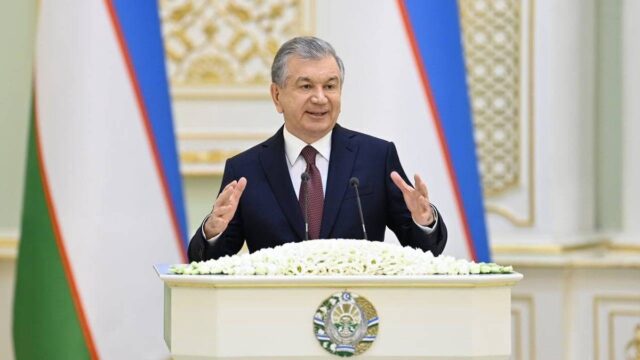Uzbekistan’s Path to Stability? Analysing the Recent Presidential Elections

Geopolitical Report ISSN 2785-2598 Volume 32 Issue 5
Authors: Silvia Boltuc & Giuliano Bifolchi
Uzbekistan recently held its presidential elections, and the re-election of Shavkat Mirziyoyev has significant importance for the country. Mirziyoyev’s victory ensures stronger governance, allowing Uzbekistan to continue its process of reforms, economic diversification, and foreign policy initiatives.
Key Findings
- Shavkat Mirziyoyev’s re-election brings much-needed stability to Uzbekistan, solidifying the current government and its leadership, providing a sense of continuity for the nation’s future.
- The completion of the presidential elections in Uzbekistan marks the culmination of the reform process started in 2022, which involved significant constitutional changes, signalling a new era of governance and policy direction for the country.
- A stable Uzbekistan, characterised by strong governance and capable local leadership, has the potential to contribute to regional stability in Central Asia, a region grappling with various local challenges.
Uzbek Presidential Elections: Information Background
The early presidential elections occurred on July 9th, 2023, in the Central Asian republic of Uzbekistan. According to the Uzbek Central Election Commission, Shavkat Mirziyoyev secured a resounding victory, receiving 87.05% of the votes.
In second place was the candidate from the Social Democratic Party “Adolat” (Justice), the first deputy chairman of the Supreme Court, Robakhon Makhmudova, with 4.43% of the votes.
The elections saw a high participation rate, with approximately 80% of eligible voters exercising their right to vote. Several regional experts considered the elections to be uncontested because of Mirziyoyev’s substantial advantage over other candidates.
Compared to the previous elections, where Mirziyoyev received 80.1% of the preferences, this time he acquired even greater support from the people. Interestingly, even before the final results were announced, leaders from neighbouring Central Asian countries expressed their congratulations to Mirziyoyev.
Gurbanguly Berdimuhamedov, the former president of Turkmenistan, Emomali Rahmon, the president of Tajikistan, Kasym-Joomart Tokaev, the president of Kazakhstan, and Sadyr Japarov, the president of Kyrgyzstan, all extended their felicitations to the victorious Uzbek president.
Uzbekistan Political Scenario
The past two years have been significant for Uzbekistan’s domestic political landscape. In 2022, the authorities embarked on a constitutional reform, which initially presented challenges and controversy.
On one hand, the country’s economy displayed positive dynamics, with a GDP growth rate exceeding 5.7%. This achievement is commendable, considering the overall economic slowdown experienced in Eurasia.
On the other hand, exactly one year ago, the Autonomous Republic of Karakalpakstan, known for its economic difficulties and distinct ethnic composition, witnessed riots that resulted in some casualties.
These protests caught both the country’s leadership and the Uzbek society off guard. The constitutional reform had to be adjusted as a response to these unforeseen events, impacting the otherwise stable and optimistic Uzbekistan, which had been witnessing changes in its economy and social sphere.
Consequently, in the first half of 2023, the Uzbek authorities successfully conducted a nationwide referendum on constitutional reforms. The referendum not only reaffirmed citizens’ confidence in the current leadership, but also introduced significant political changes.
The amendments effectively reset President Shavkat Mirziyoyev’s presidential terms, allowing him to run for two more terms. Furthermore, the presidential term was extended from 5 to 7 years. These transformations will exert a substantial influence on Uzbekistan’s internal political landscape.
Upon securing his new presidential term, Shavkat Mirziyoyev will face a wide range of challenges that extend beyond the improvement of citizens’ well-being.
These tasks encompass the development of energy systems, life support infrastructure for the population, and the enhancement of state apparatus efficiency.
While progress has been made in eliminating archaic features associated with Uzbekistan during Islam Karimov’s presidency, such as isolationist foreign policies, the leadership will need to exert even greater efforts to overcome resistance from certain elites and the bureaucracy to achieve similar political, economic, and social effects.
At the international level, the re-election of Mirziyoyev will have no adverse effects on interactions with key partners. Russia, China, and neighbouring countries in the region will view Mirziyoyev’s re-election positively. It reduces political uncertainty and minimises the risks that could have emerged from internal political dynamics during the pre-election period in Uzbekistan.
Conclusion
Since the eruption of the Ukraine conflict in February 2022, the intense competition among international powers has cast a significant spotlight on Central Asia. The region’s strategic position as a vital logistical hub bridging Europe and Asia, coupled with its abundant natural resources, has drawn the attention of global players such as Russia, China, the United States, and Europe.
In this intricate geopolitical landscape, stability and cooperation stand out as pivotal factors shaping the domestic and foreign policies of the Central Asian republics.
In such a context, the re-election of Shavkat Mirziyoyev carries profound implications for ensuring national stability, a crucial element for investors who are consistently wary of government changes that could potentially disrupt their business ventures. Mirziyoyev’s continuity in leadership provides a sense of reassurance and confidence in Uzbekistan’s governance, creating a favourable environment for economic activities and attracting potential investors.
Zooming out to the regional level, 2023 witnessed not only Mirziyoyev’s re-election but also the re-election of Kazakh President Kassym-Jomart Tokayev follower by the national parliamentary elections.
These developments highlight how both Uzbekistan and Kazakhstan have navigated the internal political crises they faced in 2022. The successful resolution of these challenges further underscores the commitment of these nations to stability, both domestically and within the broader Central Asian region.
Do you like SpecialEurasia reports and analyses? Have our groundbreaking research empowered you or your team? Now is your chance to be a part of our mission! Join us in advancing independent reporting and unlocking the secrets of Eurasia’s complex geopolitical landscape. Whether through a one-time contribution or a monthly/yearly donation, your support will fuel our relentless pursuit of knowledge and understanding. Together, let’s pave the way for a brighter future. DONATE NOW and secure your place in shaping the geopolitical narrative.
